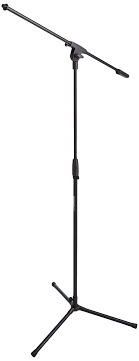A great sound setup starts with the right tools. A tripod mic stand is essential, whether you’re recording a podcast, streaming online, or performing on stage. This versatile tool provides the stability and convenience you need for clear and professional sound. Let’s dive deeper into how a tripod mic can transform your audio experience.

Why You Need a Tripod Mic Stand

A tripod mic stand is more than just a mic holder. Its design is built for stability, featuring three sturdy legs that keep your microphone steady during use. This stability reduces vibrations and ensures better sound quality.
Another advantage of a tripod mic stand is its hands-free functionality. With your free hands, you can focus on singing, speaking, or playing an instrument without distraction. Adjusting its height and angle allows you to work in comfort, whether you’re sitting or standing.
Moreover, the tripod mic stand is versatile. From studio recordings to live performances and even casual streaming, this stand adapts to various needs.
Types of Tripod Mic Stands
Standard Tripod Mic Stand

Features a simple, vertical design.
Ideal for vocals, podcasts, and basic recordings.
Boom Arm Tripod Mic Stand

Comes with an adjustable arm for precise mic placement.
Best for instruments, group setups, or unique recording angles.
Desktop Tripod Mic Stand

Compact and lightweight, perfect for small spaces.
Designed for streaming, gaming, and desk-based recordings.
Heavy-Duty Tripod Mic Stand

Built to support heavier microphones.
Suitable for outdoor use or professional studios.
Here’s a quick comparison:
| Type | Use | Best For |
| Standard Tripod Stand | Vocals, podcasting | Beginners, general use |
| Boom Arm Tripod Stand | Instruments, setups | Musicians, producers |
| Desktop Tripod Stand | Streaming, desk use | Streamers, gamers |
| Heavy-Duty Tripod Stand | Outdoor, heavy mics | Professionals, events |
Features to Look For

Durable Materials
High-quality materials, like steel or aluminum, make the stand last longer.
Portability
Lightweight designs are easier to transport for gigs or travel.
Height Adjustability
The ability to raise or lower the mic ensures a comfortable experience.
Mic Compatibility
Ensure the stand supports your specific microphone model.
Maintenance Tips
To keep your tripod mic stand in good shape, follow these simple tips:
Wipe it down with a cloth to remove dust and dirt.
Check screws and joints regularly and tighten them if needed.
Avoid overloading the stand with heavy microphones it can’t support.
Store it in a dry, safe space to prevent damage or rust.
Uses of Tripod Mic Stands
Live Performances: Hold microphones for singers and instrumentalists.
Podcasting: Keeps the mic steady for high-quality voice recordings.
Broadcasting: A common tool in studios for consistent audio output.
Streaming and Gaming: Compact stands fit perfectly on desks.
Public Speaking: Ideal for hands-free speeches and presentations.
Best Tripod Mic Stands on the Market
| Model | Weight | Height Range | Price Range |
| Samson MK10 | 1.5 kg | 35–63 inches | $30–$50 |
| On-Stage MS7701B | 2.2 kg | 36–65 inches | $30–$40 |
| Amazon Basics Tripod | 1.2 kg | 30–52 inches | $20–$30 |
| Hercules MS533B | 2.6 kg | 37–66 inches | $100–$120 |
Availability in Other Countries
Australia
Widely available on Amazon Australia, JB Hi-Fi, and music retailers like Store DJ.
Popular brands include Rode, K&M, and On-Stage.
Middle East
Platforms like Noon, Amazon UAE, and local music stores in the UAE, Saudi Arabia, and other GCC countries stock tripod mic stands.
Africa
Availability may vary; in larger markets like South Africa, platforms like Takealot and specialized music stores carry tripod mic stands.
In other regions, availability may depend on online imports.
Final Thoughts
A tripod mic stand is a small investment with big rewards. It enhances sound quality, provides comfort, and adds professionalism to your setup. With the right stand, your recording or performance becomes seamless and efficient. Choose wisely and maintain it well. Let your sound stand out with a reliable tripod mic stand.

